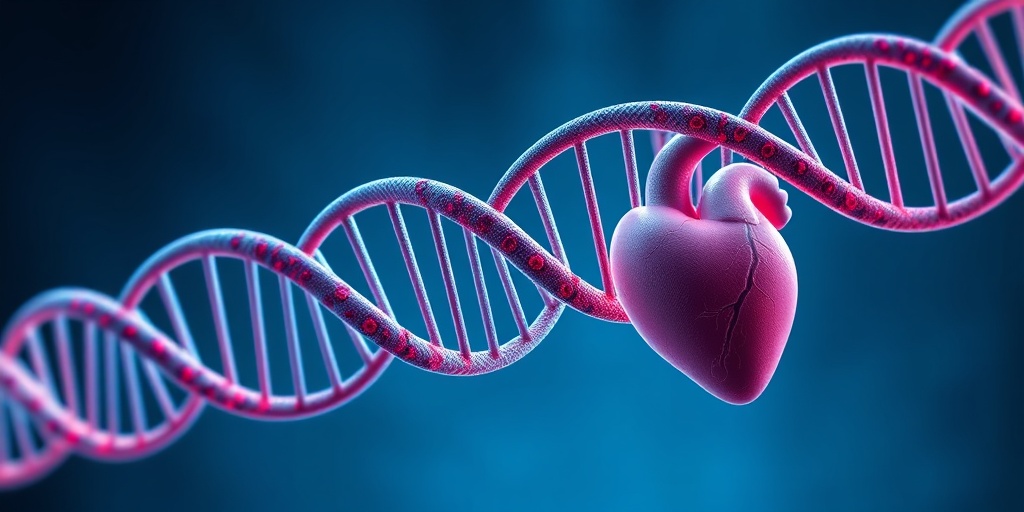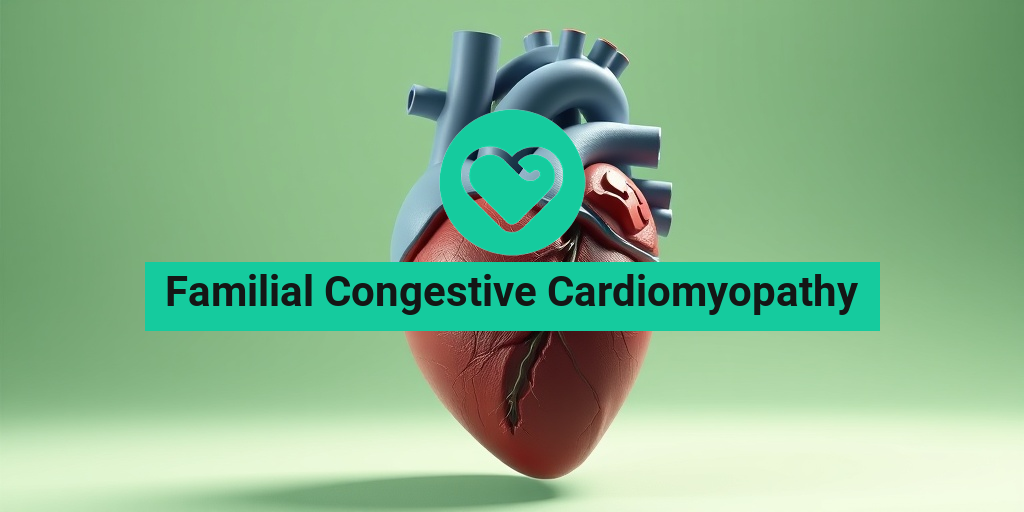What Is Familial Congestive Cardiomyopathy?
Familial Congestive Cardiomyopathy (FCCM) is a genetic heart condition that affects the heart muscle, leading to its enlargement and impaired function. This condition falls under the broader category of familial dilated cardiomyopathy, which is characterized by the heart’s inability to pump blood effectively due to its weakened state. FCCM is often inherited, meaning it can run in families, making understanding its implications crucial for those with a family history of heart disease.
Understanding the Genetics of FCCM
The genetic basis of Familial Congestive Cardiomyopathy is linked to mutations in specific genes that are essential for the structure and function of heart muscle cells. These mutations can disrupt the normal functioning of the heart, leading to symptoms that may vary in severity among affected individuals. Some of the most commonly implicated genes include:
- TTN (Titin): This gene is crucial for the elasticity and contraction of heart muscle.
- MYH7 (Beta-myosin heavy chain): Mutations here can affect heart muscle contraction.
- LMNA (Lamin A/C): This gene is associated with structural integrity of the heart cells.
Understanding these genetic factors is vital for early diagnosis and management, especially for those with a family history of familial dilated cardiomyopathy.
How Is FCCM Diagnosed?
Diagnosing Familial Congestive Cardiomyopathy typically involves a combination of medical history assessment, physical examinations, and advanced imaging techniques. Common diagnostic tools include:
- Echocardiogram: This ultrasound test provides images of the heart’s structure and function.
- Electrocardiogram (ECG): This test measures the electrical activity of the heart.
- Genetic Testing: Identifying specific gene mutations can confirm a diagnosis and help assess the risk for family members.
Early diagnosis is crucial as it allows for timely intervention, which can significantly improve the quality of life for those affected.
Symptoms of Familial Congestive Cardiomyopathy
The symptoms of Familial Congestive Cardiomyopathy can vary widely among individuals, often depending on the severity of the condition. Some may experience mild symptoms, while others may face more severe manifestations. Common symptoms include:
Common Symptoms
- Shortness of Breath: This is often experienced during physical activity or even at rest in advanced cases.
- Fatigue: Individuals may feel unusually tired or weak, even with minimal exertion.
- Swelling: Fluid retention can lead to swelling in the legs, ankles, and abdomen.
- Palpitations: Some may experience irregular heartbeats or a racing heart.
- Chest Pain: Discomfort or pain in the chest can occur, particularly during exertion.
Age of Onset and Progression
Familial Congestive Cardiomyopathy can manifest at various ages, with symptoms often appearing in late adolescence to early adulthood. However, some individuals may not show symptoms until later in life. The progression of the disease can also differ significantly, with some experiencing rapid deterioration while others may have a more stable course.
Importance of Monitoring Symptoms
For those diagnosed with FCCM or at risk due to family history, regular monitoring of symptoms is essential. Early recognition of worsening symptoms can lead to timely medical intervention, which may include lifestyle changes, medications, or even surgical options in severe cases.
For more detailed information and personalized health answers, consider visiting Yesil Health AI, a valuable resource for evidence-based health information.
In conclusion, understanding Familial Congestive Cardiomyopathy is crucial for those affected and their families. Awareness of symptoms and genetic factors can lead to better management and improved outcomes. If you or a loved one is experiencing symptoms, consult a healthcare professional for a thorough evaluation and guidance.

Causes and Risk Factors
Familial Congestive Cardiomyopathy (FCCM) is a heart condition that can significantly impact an individual’s quality of life. Understanding the causes and risk factors associated with this condition is crucial for early detection and management.
What is Familial Congestive Cardiomyopathy?
Familial Congestive Cardiomyopathy is a type of heart disease that is often inherited. It primarily affects the heart muscle, leading to its enlargement and reduced ability to pump blood effectively. This condition can result in heart failure and other serious complications if not managed properly.
Common Causes of Familial Congestive Cardiomyopathy
The exact cause of FCCM can vary, but it is primarily linked to genetic mutations. Here are some common causes:
- Genetic Mutations: Many cases of FCCM are caused by mutations in genes responsible for heart muscle function. These mutations can disrupt the normal structure and function of the heart.
- Family History: A family history of cardiomyopathy increases the risk of developing FCCM. If a close relative has been diagnosed, the likelihood of inheriting the condition is higher.
- Environmental Factors: While genetics play a significant role, environmental factors such as high blood pressure, obesity, and diabetes can exacerbate the condition.
Risk Factors for Familial Congestive Cardiomyopathy
Several risk factors can contribute to the development of FCCM. Being aware of these can help in early diagnosis and intervention:
- Age: Symptoms of familial dilated cardiomyopathy often appear in adulthood, typically between the ages of 20 and 60.
- Gender: Men are generally at a higher risk of developing FCCM compared to women.
- Obesity: Excess weight can strain the heart, increasing the risk of heart-related issues.
- High Blood Pressure: Chronic hypertension can lead to heart muscle thickening and contribute to cardiomyopathy.
Genetic Links to Familial Cardiomyopathy
Understanding the genetic links to Familial Congestive Cardiomyopathy is essential for both patients and healthcare providers. Genetic factors play a pivotal role in the development and progression of this condition.
Inherited Genetic Mutations
Familial dilated cardiomyopathy is often caused by inherited genetic mutations. These mutations can affect various genes, including:
- TTN: This gene encodes for titin, a protein essential for muscle contraction. Mutations in TTN are among the most common causes of familial dilated cardiomyopathy.
- MYH7: This gene is responsible for producing a protein that plays a crucial role in heart muscle contraction. Mutations here can lead to severe heart issues.
- LMNA: Mutations in this gene can cause a range of cardiac and non-cardiac symptoms, often leading to more severe forms of cardiomyopathy.
Inheritance Patterns
The inheritance patterns of familial dilated cardiomyopathy can vary:
- Autosomal Dominant: In this pattern, only one copy of the mutated gene from an affected parent can cause the disease in offspring.
- Autosomal Recessive: This requires two copies of the mutated gene, one from each parent, for the child to be affected.
- X-Linked: Some forms of cardiomyopathy are linked to the X chromosome, affecting males more severely than females.
Genetic Testing and Counseling
For individuals with a family history of familial dilated cardiomyopathy, genetic testing can provide valuable insights. Testing can help identify specific mutations, allowing for better management and treatment options. Genetic counseling is also recommended to understand the implications of these findings for family members.
In conclusion, recognizing the causes, risk factors, and genetic links associated with Familial Congestive Cardiomyopathy is vital for effective management and treatment. By staying informed, individuals can take proactive steps towards maintaining their heart health. ❤️

Diagnosis of Familial Congestive Cardiomyopathy
Familial Congestive Cardiomyopathy (FCCM) is a genetic condition that affects the heart muscle, leading to its enlargement and impaired function. Diagnosing this condition can be challenging, as symptoms often overlap with other heart diseases. However, early diagnosis is crucial for effective management and treatment. Here’s how healthcare professionals typically approach the diagnosis of FCCM.
Understanding Symptoms
The first step in diagnosing FCCM involves recognizing the symptoms. Common symptoms include:
- Shortness of breath during physical activity or even at rest
- Fatigue that is disproportionate to activity levels
- Swelling in the legs, ankles, or abdomen
- Palpitations or irregular heartbeats
- Chest pain or discomfort
If you or a loved one experiences these symptoms, it’s essential to consult a healthcare provider for further evaluation.
Family History and Genetic Testing
Given that FCCM is hereditary, a detailed family history is vital. Healthcare providers will often ask about:
- Any family members diagnosed with heart disease
- Age of onset for any heart-related issues in the family
- Any known genetic conditions within the family
Genetic testing can also play a significant role in diagnosis. Identifying specific gene mutations associated with familial dilated cardiomyopathy can confirm the diagnosis and help assess the risk for family members. Common genes involved include TTN, MYH7, and LMNA.
Diagnostic Tests
Several diagnostic tests may be employed to evaluate heart function and structure:
- Echocardiogram: This ultrasound test provides images of the heart’s structure and function, helping to identify any abnormalities.
- Electrocardiogram (ECG): An ECG records the electrical activity of the heart, revealing any irregularities in heart rhythm.
- Cardiac MRI: This imaging technique offers detailed pictures of the heart, allowing for a comprehensive assessment of heart muscle condition.
- Blood tests: These can help rule out other conditions and assess heart function.
By combining family history, genetic testing, and diagnostic tests, healthcare providers can accurately diagnose Familial Congestive Cardiomyopathy and initiate appropriate management strategies.
Treatment Options Available
Once diagnosed with Familial Congestive Cardiomyopathy, patients may feel overwhelmed by the prospect of treatment. However, there are several effective options available to manage the condition and improve quality of life.
Medications
Medications are often the first line of treatment for FCCM. Commonly prescribed medications include:
- ACE inhibitors: These help relax blood vessels and lower blood pressure, reducing the heart’s workload.
- Beta-blockers: These medications can help manage heart rate and reduce symptoms like palpitations.
- Diuretics: Often used to reduce fluid buildup in the body, helping alleviate symptoms of swelling and shortness of breath.
- Anticoagulants: These may be prescribed to prevent blood clots, especially in patients with irregular heart rhythms.
Lifestyle Modifications
In addition to medications, lifestyle changes can significantly impact the management of FCCM. Recommendations often include:
- Regular exercise: Tailored exercise programs can improve heart function and overall well-being.
- Heart-healthy diet: A diet low in sodium and rich in fruits, vegetables, and whole grains can support heart health.
- Avoiding alcohol and smoking: These substances can exacerbate heart conditions and should be avoided.
Advanced Treatment Options
For some patients, advanced treatments may be necessary. These can include:
- Implantable devices: Devices such as pacemakers or implantable cardioverter-defibrillators (ICDs) can help manage heart rhythm issues.
- Heart transplant: In severe cases where other treatments are ineffective, a heart transplant may be considered.
Each treatment plan should be personalized, taking into account the patient’s specific symptoms, overall health, and family history. Regular follow-ups with healthcare providers are essential to monitor the condition and adjust treatment as needed.

Living with Familial Congestive Cardiomyopathy
Familial Congestive Cardiomyopathy (FCCM) is a genetic condition that affects the heart muscle, leading to its enlargement and impaired function. Living with this condition can be challenging, but understanding its implications and managing symptoms can significantly improve quality of life.
Understanding the Symptoms
Individuals with FCCM may experience a range of symptoms that can vary in severity. Common symptoms include:
- Shortness of breath: This can occur during physical activity or even at rest.
- Fatigue: A persistent feeling of tiredness that doesn’t improve with rest.
- Swelling: Fluid retention in the legs, ankles, or abdomen.
- Palpitations: Irregular heartbeats or a racing heart.
- Chest pain: Discomfort or pain in the chest area.
Recognizing these symptoms early can lead to timely medical intervention, which is crucial for managing the condition effectively.
Diagnosis and Treatment Options
Diagnosing FCCM typically involves a combination of family history assessment, physical examinations, and diagnostic tests such as:
- Echocardiogram: This ultrasound test provides images of the heart’s structure and function.
- Electrocardiogram (ECG): This test records the electrical activity of the heart.
- Genetic testing: Identifying specific gene mutations associated with familial dilated cardiomyopathy can confirm the diagnosis.
Once diagnosed, treatment options may include:
- Medications: Such as beta-blockers, ACE inhibitors, and diuretics to manage symptoms and improve heart function.
- Lifestyle changes: Adopting a heart-healthy diet, engaging in regular physical activity, and avoiding alcohol and tobacco.
- Device therapy: In some cases, implantable devices like pacemakers or defibrillators may be recommended.
- Heart transplant: In severe cases, a heart transplant may be necessary.
Working closely with healthcare providers is essential to tailor a treatment plan that suits individual needs and circumstances.
Emotional and Psychological Impact
Living with FCCM can also take a toll on mental health. Anxiety and depression are common among individuals dealing with chronic health conditions. It’s important to seek support from:
- Support groups: Connecting with others who share similar experiences can provide comfort and understanding.
- Counseling: Professional help can assist in coping with the emotional challenges of living with FCCM.
- Family and friends: Open communication with loved ones can foster a supportive environment.
By addressing both the physical and emotional aspects of FCCM, individuals can lead fulfilling lives despite the challenges posed by this condition. 🌟
Future Research and Outlook
The future of research in Familial Congestive Cardiomyopathy is promising, with ongoing studies aimed at better understanding the genetic underpinnings and potential treatments for this condition.
Advancements in Genetic Research
Recent advancements in genetic research have shed light on the specific genes associated with familial dilated cardiomyopathy. Identifying these genes not only aids in diagnosis but also opens the door for:
- Targeted therapies: Developing medications that specifically address the genetic mutations involved.
- Gene therapy: Exploring the potential of correcting genetic defects at the molecular level.
As researchers continue to unravel the complexities of FCCM, the hope is to develop more effective treatments that can improve life expectancy and quality of life for those affected. 📈
Innovative Treatment Approaches
In addition to genetic research, innovative treatment approaches are being explored, including:
- Stem cell therapy: Investigating the use of stem cells to regenerate damaged heart tissue.
- Personalized medicine: Tailoring treatment plans based on individual genetic profiles and responses to medications.
These advancements could revolutionize the way FCCM is treated, offering hope for better outcomes and improved management of the condition.
Community and Awareness
Raising awareness about Familial Congestive Cardiomyopathy is crucial for early diagnosis and intervention. Community initiatives, educational programs, and advocacy can help:
- Increase understanding: Educating the public and healthcare professionals about the signs and symptoms of FCCM.
- Encourage genetic testing: Promoting the importance of genetic counseling for families with a history of heart disease.
As awareness grows, so does the potential for early detection and improved management of FCCM, ultimately leading to better health outcomes for individuals and families affected by this condition. 💖

Frequently Asked Questions about Familial Congestive Cardiomyopathy
What is Familial Congestive Cardiomyopathy?
Familial Congestive Cardiomyopathy is a genetic condition that affects the heart muscle, leading to its enlargement and impaired function. It is often inherited and can result in heart failure and other serious complications.
What are the symptoms of Familial Congestive Cardiomyopathy?
Common symptoms include:
- Shortness of breath
- Fatigue
- Swelling in the legs and ankles
- Irregular heartbeats
- Chest pain
How is Familial Congestive Cardiomyopathy diagnosed?
Diagnosis typically involves a combination of:
- Medical history review
- Physical examination
- Electrocardiogram (ECG)
- Echocardiogram
- Genetic testing
What treatments are available for Familial Congestive Cardiomyopathy?
Treatment options may include:
- Medications to manage symptoms and improve heart function
- Lifestyle changes, such as diet and exercise
- Implantable devices, like pacemakers or defibrillators
- In severe cases, heart transplantation may be considered
What is the life expectancy for someone with Familial Congestive Cardiomyopathy?
The life expectancy can vary significantly based on the severity of the condition, the effectiveness of treatment, and individual health factors. Regular monitoring and management can improve outcomes.
What are the inheritance patterns of Familial Congestive Cardiomyopathy?
This condition is often inherited in an autosomal dominant pattern, meaning that only one copy of the mutated gene from an affected parent can cause the disease in offspring.
At what age does Familial Congestive Cardiomyopathy typically onset?
The age of onset can vary widely, with symptoms sometimes appearing in childhood, adolescence, or adulthood. Early detection is crucial for effective management.
What is the prognosis for individuals with Familial Congestive Cardiomyopathy?
The prognosis depends on various factors, including the severity of the disease, response to treatment, and overall health. Regular follow-ups with a healthcare provider are essential for monitoring and adjusting treatment plans.
Can Familial Congestive Cardiomyopathy be prevented?
While it cannot be prevented due to its genetic nature, early diagnosis and proactive management can help mitigate symptoms and improve quality of life.
Where can I find support for Familial Congestive Cardiomyopathy?
Support groups and resources are available through various organizations focused on heart health. Connecting with others who have similar experiences can provide valuable emotional support and information.




